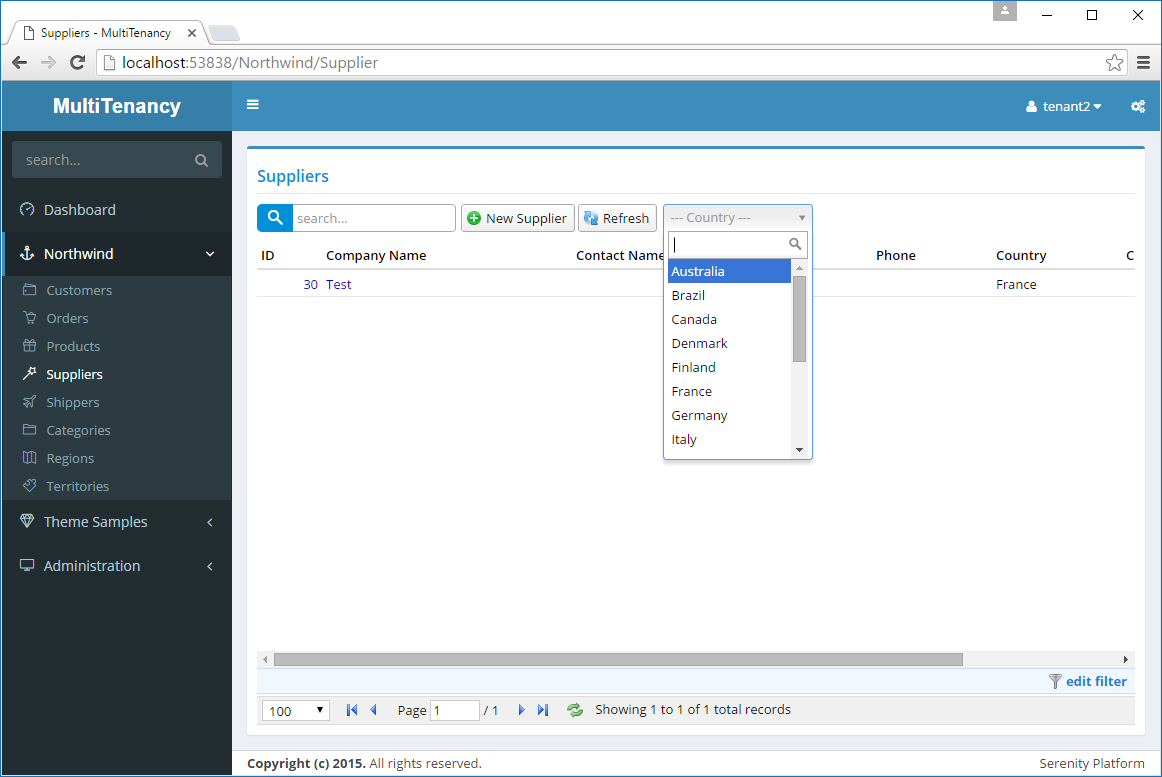Handling Lookup Scripts
If we open Suppliers page now, we'll see that tenant2 can only see suppliers that belongs to its tenant. But on top right of the grid, in country dropdown, all countries are listed:

This data is feed to script side through a dynamic script. It doesn't load this data with List services we handled recently.
The lookup script that produces this dropdown is defined in SupplierCountryLookup.cs:
namespace MultiTenancy.Northwind.Scripts
{
using Serenity.ComponentModel;
using Serenity.Data;
using Serenity.Web;
[LookupScript("Northwind.SupplierCountry")]
public class SupplierCountryLookup :
RowLookupScript<Entities.SupplierRow>
{
public SupplierCountryLookup()
{
IdField = TextField = "Country";
}
protected override void PrepareQuery(SqlQuery query)
{
var fld = Entities.SupplierRow.Fields;
query.Distinct(true)
.Select(fld.Country)
.Where(
new Criteria(fld.Country) != "" &
new Criteria(fld.Country).IsNotNull());
}
protected override void ApplyOrder(SqlQuery query)
{
}
}
}
We couldn't use a simple [LookupScript] attribute on a row class here, because there is actually no country table in Northwind database. We are collecting country names from existing records in Supplier table using distinct.
We should filter its query by current tenant.
But this lookup class derives from RowLookupScript base class. Let's create a new base class, to prepare for other lookup scripts that we'll have to handle later.
namespace MultiTenancy.Northwind.Scripts
{
using Administration;
using Serenity;
using Serenity.Data;
using Serenity.Web;
using System;
public abstract class MultiTenantRowLookupScript<TRow> :
RowLookupScript<TRow>
where TRow : Row, IMultiTenantRow, new()
{
public MultiTenantRowLookupScript()
{
Expiration = TimeSpan.FromDays(-1);
}
protected override void PrepareQuery(SqlQuery query)
{
base.PrepareQuery(query);
AddTenantFilter(query);
}
protected void AddTenantFilter(SqlQuery query)
{
var r = new TRow();
query.Where(r.TenantIdField ==
((UserDefinition)Authorization.UserDefinition).TenantId);
}
public override string GetScript()
{
return TwoLevelCache.GetLocalStoreOnly("MultiTenantLookup:" +
this.ScriptName + ":" +
((UserDefinition)Authorization.UserDefinition).TenantId,
TimeSpan.FromHours(1),
new TRow().GetFields().GenerationKey, () =>
{
return base.GetScript();
});
}
}
}
This will be our base class for multi-tenant lookup scripts.
We first set expiration to a negative timespan to disable caching. Why do we have to do this? Because dynamic script manager caches lookup scripts by their keys. But we'll have multiple versions of a lookup script based on TenantId values.
We'll turn off caching at dynamic script manager level and handle caching ourself in GetScript method. In GetScript method, we are using TwoLevelCache.GetLocalStoreOnly to call base method, that generates our lookup script, and cache its result with a cache key including TenantId.
See relevant section for more info about TwoLevelCache class.
By overriding, PrepareQuery method, we are adding a filter by current TenantId, just like we did in list service handlers.
Now its time to rewrite our SupplierCountryLookup using this new base class:
namespace MultiTenancy.Northwind.Scripts
{
using Serenity.ComponentModel;
using Serenity.Data;
using Serenity.Web;
[LookupScript("Northwind.SupplierCountry")]
public class SupplierCountryLookup :
MultiTenantRowLookupScript<Entities.SupplierRow>
{
public SupplierCountryLookup()
{
IdField = TextField = "Country";
}
protected override void PrepareQuery(SqlQuery query)
{
var fld = Entities.SupplierRow.Fields;
query.Distinct(true)
.Select(fld.Country)
.Where(
new Criteria(fld.Country) != "" &
new Criteria(fld.Country).IsNotNull());
AddTenantFilter(query);
}
protected override void ApplyOrder(SqlQuery query)
{
}
}
}
We just called AddTenantFilter method manually, because we weren't calling base PrepareQuery method here (so it won't be called by base class).
Please first delete Northwind.DynamicScripts.cs file, if you have it.
There are several more similar lookup scripts in CustomerCountryLookup, CustomerCityLookup, OrderShipCityLookup, OrderShipCountryLookup. I'll do similar changes in them. Change base class to MultiTenantRowLookupScript and call AddTenantFilter in PrepareQuery method.
We now have one more problem to solve. If you open Orders page, you'll see that Ship Via and Employee filter dropdowns still lists records from other tenants. It is because we defined their lookup scripts by a [LookupScript] attribute on their rows.
Let's fix employee lookup first. Remove [LookupScript] attribute from EmployeeRow.
[ConnectionKey("Northwind"), DisplayName("Employees"), InstanceName("Employee"), TwoLevelCached]
[ReadPermission(Northwind.PermissionKeys.General)]
[ModifyPermission(Northwind.PermissionKeys.General)]
public sealed class EmployeeRow : Row, IIdRow, INameRow, IMultiTenantRow
{
//...
And define a new lookup in file EmployeeLookup next to EmployeeRow.cs:
namespace MultiTenancy.Northwind.Scripts
{
using Entities;
using Serenity.ComponentModel;
using Serenity.Web;
[LookupScript("Northwind.Employee")]
public class EmployeeLookup :
MultiTenantRowLookupScript<EmployeeRow>
{
}
}
We don't have to override anything, as base class will handle everything for us. By default, LookupScript attribute on rows, defines a new automatic lookup script class by using RowLookupScript as base class.
As there is no way to override this base class per row, we defined our lookup script class explicitly, and used MultiTenantRowLookupScript as base class.
Now if you build and run application, you'll have an error:
'MultiTenancy.Northwind.Entities.EmployeeRow' type doesn't have a
[LookupScript] attribute, so it can't be used with a LookupEditor!
This is because we don't have a [LookupScript] attribute on top of our row class, but in some places like forms, we used [LookupEditor(typeof(EmployeeRow))].
Open OrderRow.cs and you'll see this attribute on top of EmployeeID property. Change it to [LookupEditor("Northwind.Employee")].
We'll do similar for ShipperRow. Remove LookupScript attribute and define class below:
namespace MultiTenancy.Northwind.Scripts
{
using Entities;
using Serenity.ComponentModel;
using Serenity.Web;
[LookupScript("Northwind.Shipper")]
public class ShipperLookup :
MultiTenantRowLookupScript<ShipperRow>
{
}
}
And on top of ShipVia property of OrderRow you'll find another similar LookupEditor attribute. Change it to [LookupEditor("Northwind.Shipper")].
Repeat same steps for ProductRow.
namespace MultiTenancy.Northwind.Scripts
{
using Entities;
using Serenity.ComponentModel;
using Serenity.Web;
[LookupScript("Northwind.Product")]
public class ProductLookup : MultiTenantRowLookupScript<ProductRow>
{
}
}
And on top of ProductID property of OrderDetailRow you'll find another similar LookupEditor attribute. Change it to [LookupEditor("Northwind.Product")].
Supplier, Category, Region, Territory are next ones we should handle similarly. See commit log of Serenity tutorials github repository.
Now Northwind supports multi-tenancy.
There might be some glitches i missed, report in Serenity Github repository if any.
This feature might be integrated into Serenity, if there will be enough interest.